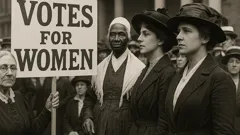332
12
4 minutes
Suggested Articles

First-generation Ivy Leaguers triumph over unique college challenges
Discover key insights, life hacks, and data-driven tips for first-generation college students thriving in prestigious U.S. universities. Find practical strategies, unique challenges, and fresh perspectives essential for student success.

Women in STEM: Shaping an Inclusive and Exciting Future for All
News & Updates

Ancient Tombs Reveal Matrilineal Power That Rewrites Human History
News & Updates

The 8 Most Common Forms of Workplace Discrimination Explained
Hiring

Students and educators defend free speech as campus politics reshape college life
Civic Education

7 Surprising Facts About the US Women's Suffrage Movement
Civic Education

Families and neighbors rediscover unity as they break political silence together
Civic Education

US Suffrage Movement: How Women Won the Vote and Changed History
Civic Education

Survivors find hope and protection with vital federal domestic violence resources
Civic Education

Unlock powerful financial independence and transform your future today
Civic Education

Americans find hope as real solutions close healthcare inequality gaps
News & Updates

First-generation Ivy Leaguers triumph over unique college challenges
Hiring

Americans brace for possible Social Security cuts that reshape retirement
News & Updates

Why this Florida data leak changes how we think about privacy
News & Updates

Build your own AI chatbot and unlock hands-on tech superpowers
Resources & Tools

How to outsmart hidden medical expenses in your golden years
Civic Education

California workers secure jobs this summer with new 2025 laws
Hiring
 Love Women Vibes
Love Women Vibes

Comments